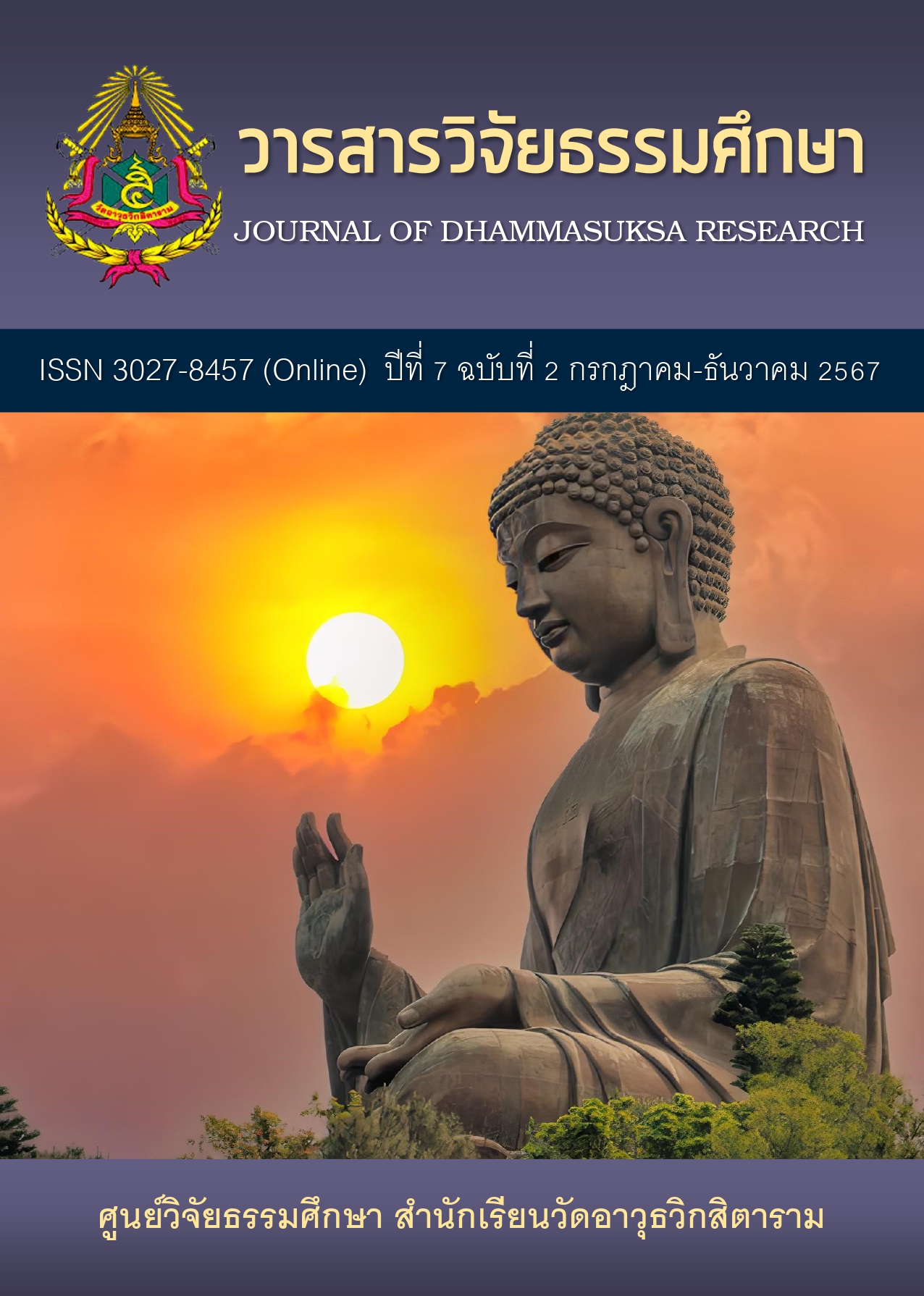Creating leadership based on the foundation of the Iddhipada
Keywords:
Iddhipada, leadership, leaderAbstract
This research is a qualitative study that analyzes documents with the objective of examining the development of leadership qualities based on Iddhipada. The research findings indicate that Iddhipada, which leads to success, consists of four components: "Chantā" (aspiration), which includes inspiration, motivation, and a desire to act; "Wiriyā" (exertion), which involves effort, perseverance, resilience, and not giving up easily on tasks; "Jitta" (Thoughtfulness), which encompasses confidence, steadfastness, having a strong mind, and dedicating oneself to the task at hand; and "Wimangsā" (Investingation), which entails using intelligence to carefully consider intentions and actions, being comprehensive, and having the wisdom to improve and develop. These four ethical components can foster the emergence of leadership qualities in individuals who practice them with altruistic intentions. Apart from fostering personal strength and opportunities for success in life, they can serve as exemplary models, inspire others, provide comfort and encouragement to colleagues, and instill hope for success and progress at both individual and organizational levels.
References
กัญชพร ปานเพ็ชร. (2565). ภาวะผู้นำเชิงจริยธรรมตามหลักวุฒิธรรมสำหรับผู้บริหารสถานศึกษาในยุค 4.0. วารสารครุศาสตร์ปริทรรศน์ฯ, 9(1), 491 - 498.
การศาสนา, กรม. (2525). พระไตรปิฎกภาษาไทย ฉบับหลวง. กรุงเทพฯ : กรมการศาสนา.
กุลนิติ เบ้าจรรยา และคณะ. (2566). การพัฒนาภาวะผู้นำของผู้บริหารสถานศึกษาในศตวรรษที่ 21 ตามหลักอิทธิบาท 4 สังกัดสำนักงานเขตพื้นที่การศึกษาประถมศึกษาขอนแก่น เขต 2. วารสารสถาบันวิจัยพิมลธรรม, 10(1), 73-85.
พระมหาบรรจง ติสรโณ (ศรีสุข). (2560). ศึกษาการประยุกต์ใช้หลักอิทธิบาทธรรม 4 ในการจัดการเรียนการสอนของโรงเรียนปริยัติคุณรสวิทยา อำเภอเมืองสุรินทร์ จังหวัดสุรินทร์. พุทธศาสตรมหาบัณฑิต. บัณฑิตวิทยาลัย : มหาวิทยาลัยมหาจุฬาลงกรณราชวิทยาลัย.
พระราชวรมุนี. (2526). พุทธศาสนากับสังคมไทย. กรุงเทพฯ : โรงพิมพ์เจริญวิทยาการพิมพ์.
พระอุทัย จารุธมฺโม (แก่นจำปา) สาโรช เผือกบัวขาว และพนิต ศรีประดิษฐ์. (2566). แนวทางการพัฒนาสมรรถนะการบริหารงานตามหลักอิทธิบาท 4 ขององค์การบริหาร ส่วนตำบลพลับพลาไชย อำเภออู่ทอง จังหวัดสุพรรณบุรี. วารสารวิชาการมหาวิทยาลัยราชภัฏเพชรบุรี, 13(1), 42-51.
ภัทราวัลย์ ดอกบัว และสุนทร สายคำ. (2563). ภาวะผู้นำการเปลี่ยนแปลงในยุคไทยแลนด์ 4.0 ตามหลักอิทธิบาท 4 ของผู้บริหารโรงเรียนเอกชน สังกัดสำนักงานศึกษาธิการจังหวัดขอนแก่น. วารสารสถาบันวิจัยพิมลธรรม, 7(1), 137-145.
สุปราณี สาระรัตน์. (2564). การประยุกต์ใช้หลักอิทธิบาท 4 สู่การเรียนรู้เชิงรุกในการเรียนภาษาอังกฤษ. วารสารปัญญา, 28(2), 95-110.
อภิสิทธิ์ วงษ์ประดิษฐ. (2564). แนวทางการพัฒนาภาวะผู้นำทางวิชาการตามหลักอิทธิบาท 4 ของผู้บริหาร โรงเรียนขนาดเล็ก สังกัดสำนักงานเขตพื้นที่การศึกษา ประถมศึกษานครสวรรค์ เขต 1. ปริญญาครุศาสตรมหาบัณฑิต. บัณฑิตวิทยาลัย : มหาวิทยาลัยมหาจุฬาลงกรณราชวิทยาลัย.
Downloads
Published
How to Cite
Issue
Section
Categories
License
Copyright (c) 2024 Journal of Dhammasuksa Research

This work is licensed under a Creative Commons Attribution-NonCommercial-NoDerivatives 4.0 International License.



